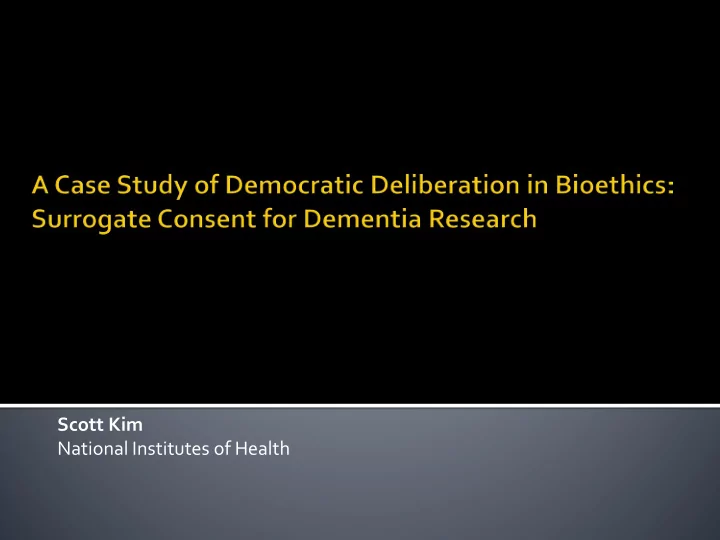

Scott Kim National Institutes of Health
These are the speaker’s opinions, not the views or policies of the NIH, DHHS, or the US government.
One way of using democratic deliberation (DD) in bioethics: consulting the public’s moral opinions. Brief case study: Surrogate consent for dementia research
Premise: the public’s values should, in some way, be reflected in policies i.e., public’s moral views have normative weight But how do you measure public’s views on morally complex issues?
Informational challenges: Complex scientific, legal, historical and ethical dimensions Need for unbiased, accurate, reasonably comprehensive information Eliciting quality judgments How can we obtain considered moral opinions?
An excellent topic for using DD methods: Unsettled policy, but with very large public health implications Complex scientific, ethical, social, and historical issues Public has not been engaged in the specific ethics debate
Pair with a nationally representative survey (Kim et al. Neurology 2009; Tomlinson et al 2015) Experimental design to measure effect of democratic deliberation (Kim et al., JERHRE 2009) Both quantitative (Kim et al Neurology 2011, PLOS One 2013) and qualitative outcomes. (DeVries et al, AJGP 2013) Assess and report quality of deliberation (De Vries et al 2010, 2011)
Opinions on 4 research scenarios: Lumbar Puncture, Drug RCT, Vaccine, Gene Transfer “…should our society allow their families to make the decision in their place?” General public, aged 51 or over within about 60 mile radius of Ann Arbor, Michigan, USA 3 arms, randomized: N=503 Control group: surveys only Education group: educational materials + surveys DD group: participate in deliberation session + surveys Surveyed 3 times S1: One month before DD session day; before randomization S2: End of DD session (approx for Control and Education groups) S3: About one month after DD session day
Knowledge Questionnaire: 17 item “quiz” regarding AD, AD clinical research, and ethical issues in AD research. Control Education DD group, Between- group, Mean only, Mean Mean (SD) groups, (SD) (SD) ANOVA p- value .855 Survey 1 11.4 (2.5) 11.3 (2.7) 11.5 (2.6) <.001 Survey 2 11.5 (2.5) 14.4 (2.6) 14.5 (2.3) <.001 Survey 3 11.5 (2.9) 13.3 (2.9) 14.1 (2.6) Both the education group and the DD group improved their understanding of issues; effect is seen even one month after DD session.
Change in Willingness to Allow Family Consent for Dementia Research Change in Attitude Toward Surrogate Based Research .6 Mean Change-scores from Survey 1 .4 S1 vs S2 S1 vs S3 .2 0 Post DD Intervention One Month Follow Up -.2 Control Session Education Control Session Education Immediate One-Month Lumbar Puncture New Drug Vaccine Gene Therapy Scale: 1=definitely not allow, 2=probably not allow, 3=probably allow, 4=definitely allow S1=baselines survey; S2=survey post DD or education; S3=one month follow up
Mean (SD) 9.4 (1.1) Do you feel that your opinions were respected by your group? 9.7 (0.7) Do you feel you were listened to by your facilitator ? 9.7 (0.7) Do you feel that the process that led to your groups' responses was fair ? 8.8 (2.3) How willing are you to abide by the group's final position , even if you personally have a different view? (Response scale: 1=Not at all, 10= Very Much )
External validity (overall response rate 21%) Participation takes full day commitment ▪ Compared with decliners: ▪ younger (63 vs 66), ▪ related to/friends with person with dementia (71% v 43%) ▪ caregiver/decision-maker for someone w dementia (23% vs 17%) Especially important for bioethics issues that engage institutional trust (e.g., biobanking)? Expensive, with many moving parts!
Democratic deliberation has a strong effect on views regarding surrogate consent for research. Effect is not due to mere increase in knowledge. Process seen as fair and trustworthy by participants. Qualitative analysis generally validates high quality of deliberation and reasoning.
Supported by NIH grant AG-RO1-029550 Greenwall Foundation Study Team: Paul Appelbaum Laura Damschroder Raymond De Vries David Knopman Aimee Stanczyk Ian Wall
Survey 1 Survey 2 Survey 3 Survey Survey (n=212) (n=173) (n=168) 1v2 1v3 p-value p-value Lumbar Puncture % % % Definitely Not Allow 5.2 0.6 3.0 Probably Not Allow 9.4 3.5 5.4 <0.001 0.001 Probably Allow 50.9 19.1 41.1 Definitely Allow 33.0 76.3 50.6 p-value p-value New Drug RCT % % % Definitely Not Allow 1.9 0.6 1.8 Probably Not Allow 3.8 2.3 2.4 <0.001 0.008 Probably Allow 56.1 21.4 42.9 Definitely Allow 37.7 75.7 53.0 p-value p-value Vaccine % % % Definitely Not Allow 9.9 7.5 7.1 Probably Not Allow 24.5 12.7 13.7 <0.001 <0.001 Probably Allow 46.2 28.3 45.2 Definitely Allow 18.9 50.9 33.9 p-value p-value Gene Transfer % % % Definitely Not Allow 17.5 16.2 14.9 Probably Not Allow 26.4 16.8 17.9 <0.001 0.002 Probably Allow 38.7 26.6 36.9 Definitely Allow 17.0 40.5 29.8 17
Recommend
More recommend